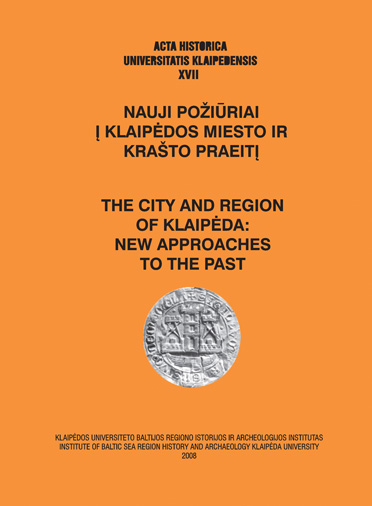Volume 17 (2008): Nauji požiūriai į Klaipėdos miesto ir krašto praeitį = The City and Region of Klaipėda: New Approaches to the Past, January 2008

Order by:
Pub. online: 30 Jan 2008
Type: Introduction
 Open Access
Open Access
Journal:
Acta Historica Universitatis Klaipedensis
Volume 17 (2008): Nauji požiūriai į Klaipėdos miesto ir krašto praeitį = The City and Region of Klaipėda: New Approaches to the Past, pp. 5–9
Pub. online: 30 Jan 2008
Type: Article
 Open Access
Open Access
Journal:
Acta Historica Universitatis Klaipedensis
Volume 17 (2008): Nauji požiūriai į Klaipėdos miesto ir krašto praeitį = The City and Region of Klaipėda: New Approaches to the Past, pp. 11–27
Abstract
Pub. online: 30 Jan 2008
Type: Article
 Open Access
Open Access
Journal:
Acta Historica Universitatis Klaipedensis
Volume 17 (2008): Nauji požiūriai į Klaipėdos miesto ir krašto praeitį = The City and Region of Klaipėda: New Approaches to the Past, pp. 29–50
Abstract
Pub. online: 30 Jan 2008
Type: Article
 Open Access
Open Access
Journal:
Acta Historica Universitatis Klaipedensis
Volume 17 (2008): Nauji požiūriai į Klaipėdos miesto ir krašto praeitį = The City and Region of Klaipėda: New Approaches to the Past, pp. 51–62
Abstract
Pub. online: 30 Jan 2008
Type: Article
 Open Access
Open Access
Journal:
Acta Historica Universitatis Klaipedensis
Volume 17 (2008): Nauji požiūriai į Klaipėdos miesto ir krašto praeitį = The City and Region of Klaipėda: New Approaches to the Past, pp. 63–77
Abstract
Pub. online: 30 Jan 2008
Type: Article
 Open Access
Open Access
Journal:
Acta Historica Universitatis Klaipedensis
Volume 17 (2008): Nauji požiūriai į Klaipėdos miesto ir krašto praeitį = The City and Region of Klaipėda: New Approaches to the Past, pp. 79–99
Abstract
Pub. online: 30 Jan 2008
Type: Article
 Open Access
Open Access
Journal:
Acta Historica Universitatis Klaipedensis
Volume 17 (2008): Nauji požiūriai į Klaipėdos miesto ir krašto praeitį = The City and Region of Klaipėda: New Approaches to the Past, pp. 101–120
Abstract
Pub. online: 30 Jan 2008
Type: Article
 Open Access
Open Access
Journal:
Acta Historica Universitatis Klaipedensis
Volume 17 (2008): Nauji požiūriai į Klaipėdos miesto ir krašto praeitį = The City and Region of Klaipėda: New Approaches to the Past, pp. 121–133
Abstract
Pub. online: 30 Jan 2008
Type: Article
 Open Access
Open Access
Journal:
Acta Historica Universitatis Klaipedensis
Volume 17 (2008): Nauji požiūriai į Klaipėdos miesto ir krašto praeitį = The City and Region of Klaipėda: New Approaches to the Past, pp. 135–149
Abstract
Pub. online: 30 Jan 2008
Type: Article
 Open Access
Open Access
Journal:
Acta Historica Universitatis Klaipedensis
Volume 17 (2008): Nauji požiūriai į Klaipėdos miesto ir krašto praeitį = The City and Region of Klaipėda: New Approaches to the Past, pp. 151–164
Abstract